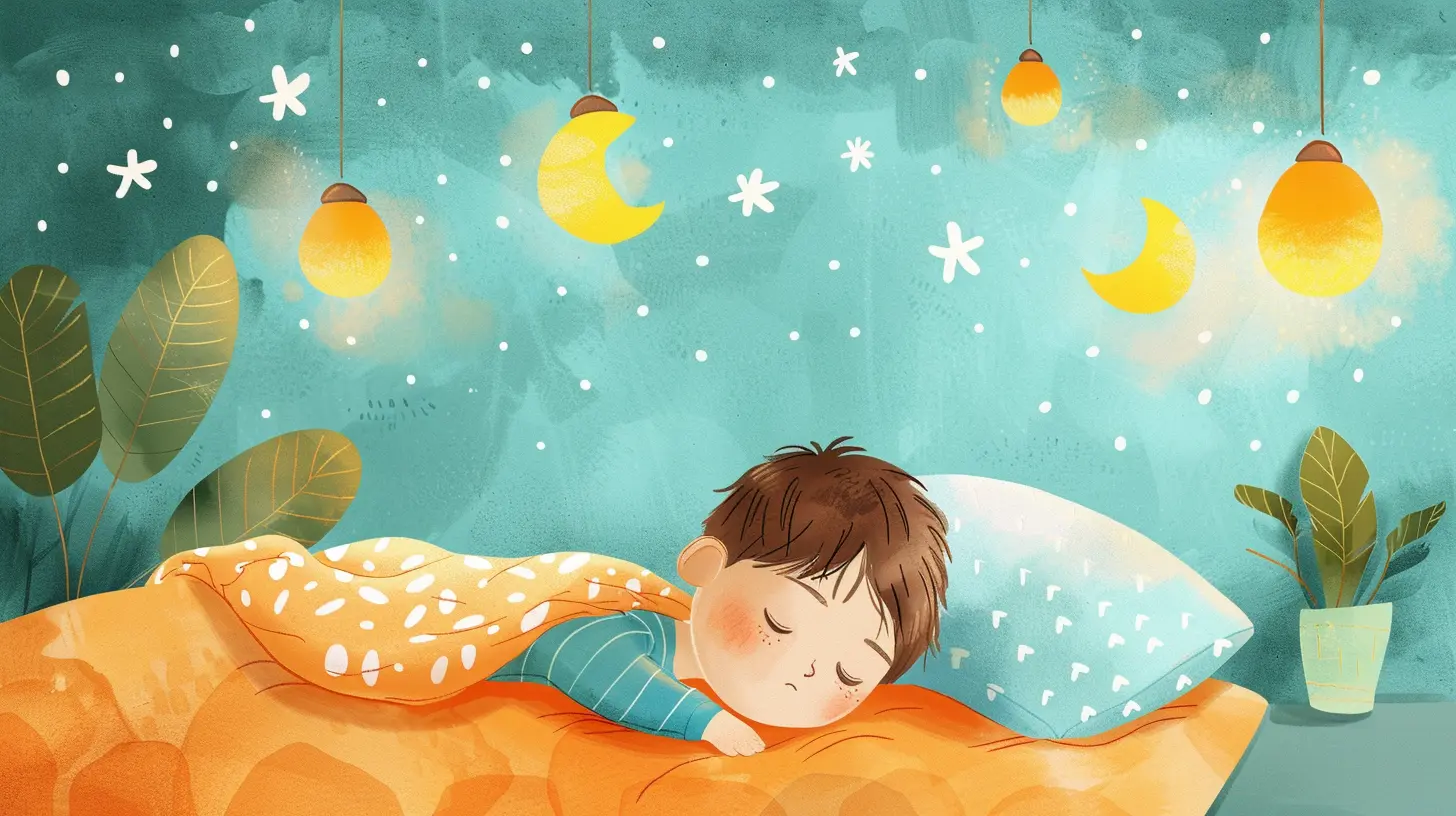Sleep and Mental Health: The Importance of Rest for Child Development
26 February 2025
We’ve all heard the saying, "A good night’s sleep is the best medicine." But for children, it’s more than just a catchy phrase – it’s a critical part of their development. Growing up is hard work for both the mind and body, and sleep is the fuel that powers this progress. Especially when it comes to mental health, sleep plays a starring role in helping children thrive.
In this article, we’ll dive deep into how sleep affects a child’s mental well-being and overall development. We’ll explore why rest is just as essential as food and exercise, and how sleep patterns can shape a child’s future mental health. Let’s get cozy and talk about the importance of sleep for child development.

Why Is Sleep Essential for Children?
Imagine trying to build a house without enough bricks. It wouldn’t be long before things start falling apart, right? Sleep is like those bricks for children – it helps build their brains and bodies. Without enough sleep, the foundation for their mental and physical health starts to crumble.Brain Development During Sleep
During sleep, the brain is far from idle. It’s working overtime to process everything a child has learned throughout the day. From that math lesson to how to tie their shoes, sleep helps organize and solidify these memories. This process is crucial for cognitive function, problem-solving, and emotional regulation.In fact, studies have shown that while children sleep, the brain strengthens neural connections that enhance learning and memory. Sleep is essentially a brain "reset" button, clearing out unnecessary information and making room for new knowledge. Without enough sleep, children may struggle with focus, attention, and emotional control.
Physical Growth and Sleep
You’ve probably heard the term "growth spurt," but did you know that sleep plays a major role in it? During deep sleep, the body releases growth hormones that help children grow – literally. This is why kids tend to sleep more during periods of rapid growth. Without sufficient sleep, their physical development can be stunted, leading to issues with bone density, muscle health, and even their immune system.
The Link Between Sleep and Mental Health
Now, let’s talk about the elephant in the room: mental health. From toddlers to teenagers, sleep (or lack thereof) has a profound impact on mental well-being.Emotional Regulation
Picture this – after a bad night’s sleep, everything feels a little more overwhelming, right? Small problems become big issues, and your patience is razor-thin. Now, imagine how a child feels after several nights of poor sleep. It’s no wonder they may have a meltdown over something as small as spilling juice.Sleep is vital for emotional regulation. A well-rested child is better equipped to manage their emotions, handle stress, and respond to challenges. In contrast, sleep-deprived children are more prone to mood swings, irritability, and even anxiety or depression.
Stress and Anxiety
Speaking of anxiety, did you know that children who don’t get enough sleep are more likely to experience symptoms of anxiety disorders? Sleep helps regulate the body’s stress response by controlling cortisol levels (the hormone responsible for stress). When children don’t get enough rest, their cortisol levels remain high, making them more susceptible to anxiety and other stress-related issues.Behavioral Challenges
Have you ever noticed that children who don’t nap or sleep well are often cranky and difficult to manage? Sleep deprivation can lead to more than just a bad mood – it can trigger behavioral issues. Children who don’t get enough sleep may exhibit impulsivity, hyperactivity, and difficulty paying attention. This is often mistaken for ADHD, but sometimes, it’s simply a lack of proper rest.It’s crucial to understand that sleep and behavior are deeply connected. A well-rested child is more likely to have the mental clarity and emotional resilience needed to behave appropriately and engage positively with others.

How Much Sleep Does a Child Really Need?
So, how much sleep is enough? It varies depending on the child’s age. Here’s a quick breakdown:- Newborns (0-3 months): 14-17 hours per day
- Infants (4-11 months): 12-15 hours per day
- Toddlers (1-2 years): 11-14 hours per day
- Preschoolers (3-5 years): 10-13 hours per day
- School-age children (6-13 years): 9-11 hours per day
- Teenagers (14-17 years): 8-10 hours per day
While these numbers provide a general guideline, each child is unique, and some may need more or slightly less sleep than others. What’s important is that parents and caregivers ensure their child is getting quality sleep regularly.

Sleep Disorders in Children
While we all know sleep is important, some children face obstacles when it comes to getting a good night’s rest. Sleep disorders in children are more common than you might think, and they can severely impact mental and physical development.Common Sleep Disorders
- Insomnia: Yes, even kids can have trouble falling asleep! Insomnia can stem from anxiety, stress, or even poor sleep habits.- Sleep Apnea: This is a condition where breathing repeatedly stops and starts during sleep. It can be caused by enlarged tonsils or other physical issues. If left untreated, sleep apnea can lead to behavioral problems and poor academic performance.
- Night Terrors: These are different from nightmares. Children experiencing night terrors may scream, thrash, or seem awake but are actually still asleep. Night terrors are often caused by stress or lack of sleep.
- Restless Leg Syndrome (RLS): This condition can make it difficult for children to fall asleep due to uncomfortable sensations in their legs. Kids with RLS often have trouble staying still, which can affect their ability to sleep soundly.
The Impact of Sleep Disorders
If a child has a sleep disorder, it can be challenging to get the rest they need. This can lead to poor academic performance, trouble concentrating, and emotional disturbances. Over time, untreated sleep disorders can contribute to long-term mental health issues like depression and anxiety.If you suspect your child has a sleep disorder, it’s essential to consult a pediatrician or sleep specialist. Early intervention can make all the difference.
Tips for Improving Children's Sleep
So, how can you help your child get the rest they need? While every child is different, there are some general tips that can encourage better sleep habits.1. Establish a Consistent Sleep Routine
Kids thrive on routine. A consistent bedtime and wake-up time, even on weekends, can help regulate their internal clock. This routine should include calming activities before bed, like reading a book, taking a warm bath, or listening to soothing music.2. Create a Sleep-Friendly Environment
Make sure your child’s bedroom is conducive to sleep. This means a cool, dark, and quiet room. Avoid bright lights and loud noises that could interfere with rest. If necessary, use blackout curtains or a white noise machine to create the ideal sleep environment.3. Limit Screen Time Before Bed
Screens emit blue light, which can interfere with the production of melatonin – the hormone responsible for sleep. Try to limit your child’s exposure to screens (like tablets, smartphones, and TVs) at least an hour before bed.4. Encourage Physical Activity
Getting enough exercise during the day can help children sleep better at night. Physical activity helps burn off excess energy and reduces stress. Just be sure to avoid intense physical activity too close to bedtime, as it can have the opposite effect and make it harder to wind down.5. Watch Out for Caffeine
Caffeine isn’t just in coffee. It’s also found in sodas, chocolate, and some energy drinks. Make sure your child isn’t consuming caffeine, especially in the afternoon and evening, as it can interfere with their ability to fall asleep.
The Long-Term Benefits of Healthy Sleep Habits
When children consistently get the sleep they need, the benefits extend far beyond the bedroom. Adequate sleep improves cognitive function, emotional regulation, and physical health. It also helps prevent mental health issues like anxiety and depression. Simply put, well-rested children are more likely to grow into healthy, happy adults.By prioritizing sleep, you’re giving your child the best possible foundation for success – both academically and emotionally. So, if there’s one thing to take away from this article, it’s this: sleep is not just a luxury. It’s a necessity, especially for children.
Conclusion
We often focus on what kids are learning in school or how they’re performing in sports, but we shouldn’t overlook the importance of sleep. It might seem like a passive activity, but sleep is an active process that plays a crucial role in a child’s mental and physical development. Without it, children struggle to manage emotions, focus in school, and grow healthily. So, whether it’s making bedtime a priority or addressing potential sleep disorders, ensuring your child gets enough rest is one of the most important things you can do for their overall well-being.Remember, sleep isn’t just about feeling rested. It’s about giving your child the tools they need to thrive.
all images in this post were generated using AI tools
Category:
Psychological Disorders In ChildAuthor:

Eliana Burton
Discussion
rate this article
10 comments
Trevor Jennings
Great insights! Emphasizing sleep’s role in child development is crucial for mental health.
April 6, 2025 at 2:49 AM

Eliana Burton
Thank you! Sleep is indeed foundational for healthy development and mental well-being in children.
Kristy Ellison
Great article! 🌟 Sleep is like a superpower for our kiddos’ brains. Prioritizing rest not only boosts their mood but also fuels their creativity and learning. Let’s champion those cozy bedtime routines—they’re essential for growing healthy minds! Keep spreading the sleep love! 💤✨
April 1, 2025 at 2:23 PM

Eliana Burton
Thank you for your kind words! 🌟 Sleep truly is vital for our children's development and creativity. Let's continue to promote healthy bedtime routines! 💤✨
Bella Middleton
Sleep is the foundation for a thriving mind! Prioritizing restful nights not only nurtures children's mental health but also fuels their potential. Let's champion the importance of rest for brighter futures!
March 22, 2025 at 4:01 AM

Eliana Burton
Absolutely! Prioritizing sleep is crucial for children's mental health and development, laying the groundwork for their future success. Thank you for highlighting its importance!
Yasmeen Curry
This article highlights a crucial aspect of child development. Sleep is often overlooked, yet its impact on mental health is profound. As a parent, it’s a reminder to prioritize restful habits for my children. Establishing a routine can foster emotional resilience and cognitive growth—something we all strive for in nurturing young minds.
March 15, 2025 at 5:06 PM

Eliana Burton
Thank you for your insight! I completely agree—establishing a solid sleep routine is essential for fostering both emotional resilience and cognitive growth in children. Your commitment to prioritizing sleep for your kids is commendable!
Zarek Ford
Ah, yes, because who needs sleep when you can just let your kids turn into tiny zombies? Clearly, a good night’s rest is overrated—why not just caffeinate them and hope for the best? After all, what’s a little sleep deprivation in the name of “character building”? Bravo, parenting!
March 10, 2025 at 4:41 PM

Eliana Burton
Thank you for your humorous take! Sleep is indeed essential for both children and parents, and prioritizing rest can lead to healthier development and well-being.
Rivenheart Thomas
Rest is vital! Happy, well-rested kids thrive and grow! 🌟
March 7, 2025 at 4:59 PM

Eliana Burton
Absolutely! Quality sleep is crucial for children's growth and mental well-being. Thank you for highlighting its importance! 🌙✨
Sablethorn McInnes
Rest fosters thriving minds.
March 6, 2025 at 5:25 AM

Eliana Burton
Absolutely! Rest is essential for cognitive development and overall well-being in children. Thank you for your insightful comment!
Brianna McIntosh
In the gentle embrace of night, Dreams weave truths, soft as light. Rest cradles minds, in slumber’s flight, Nurturing growth, igniting insight. For every child, in stillness found, Health and joy bloom, safe and sound.
March 2, 2025 at 5:40 AM

Eliana Burton
Thank you for your beautiful words! They perfectly capture the essence of how vital restful sleep is for fostering children's mental health and development.
Selah Bowers
This article highlights a crucial connection between sleep and mental health in children. Quality rest is essential for their development, affecting emotional well-being and cognitive function. Parents should prioritize healthy sleep habits to support their child's growth and mental resilience.
March 1, 2025 at 3:48 AM

Eliana Burton
Thank you for your insightful comment! Prioritizing quality sleep is indeed vital for children's overall development and mental health.
Flora Cummings
Prioritizing sleep is essential for nurturing young minds. A well-rested child is more resilient, creative, and ready to thrive in life!
February 26, 2025 at 4:58 PM

Eliana Burton
Absolutely! Prioritizing sleep is crucial for children's development and overall well-being, fostering resilience and creativity. Thank you for highlighting this important aspect!
MORE POSTS

Trusting Again: Emotional Healing After Betrayal

How to Build Resilience During Challenging Times

Why We Need to Move Beyond Appearance-Based Compliments

The Long-Term Effects of Childhood Neglect on Mental Health

The Impact of Social Support on Stress Management

The Role of Laughter in Reducing Stress

Cognitive Development in Adolescence: What Changes?